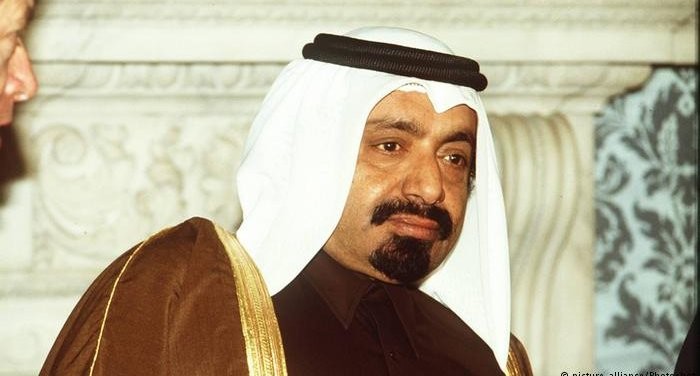shilohcreekkennels.com – Emir Khalifa bin Hamad Al Thani, who ruled Qatar from 1972 to 1995, played a critical role in transforming the small Gulf state into a modern and prosperous nation. His leadership was marked by a combination of social, economic, and political reforms that paved the way for Qatar’s rise as a regional power. Under his reign, Qatar experienced significant economic development, modern infrastructure, and a strategic reorientation of its foreign policy. Emir Khalifa’s long-standing legacy continues to influence Qatar’s contemporary position on the global stage.
Early Life and Ascension to the Throne
Born on September 17, 1932, Khalifa bin Hamad Al Thani was a member of Qatar’s ruling family, the Al Thani. He was educated locally and came to prominence within the Qatari government in the 1960s. In 1964, Khalifa was appointed as the country’s Minister of the Interior, a position that enabled him to become closely involved in Qatar’s internal affairs.
In 1972, after the abdication of his cousin, Emir Ahmad bin Ali Al Thani, Khalifa bin Hamad ascended to the throne. At just 40 years old, he inherited a small, relatively underdeveloped country, with an economy still largely dependent on pearling and fishing. However, Qatar was sitting on vast oil and natural gas reserves, which would soon become the foundation for the nation’s transformation.
Economic Modernization and Infrastructure Development
Emir Khalifa’s rule marked the beginning of a rapid economic transformation for Qatar. He recognized the potential of Qatar’s natural resources and took decisive steps to modernize the country’s infrastructure and economy. The revenue from oil and natural gas exports became a central part of the national budget, which Khalifa used to finance ambitious infrastructure projects.
One of his major contributions to Qatar’s modernization was the development of the oil and gas sector. Emir Khalifa oversaw the expansion of the country’s oil production and, later, the development of its vast natural gas reserves. These resources allowed Qatar to generate the wealth necessary to fund large-scale projects that would reshape the nation’s economy.
Under his leadership, Qatar invested heavily in infrastructure, including the construction of roads, schools, hospitals, and modern housing. The rapid economic growth also led to significant urbanization, with the capital city of Doha seeing major development in terms of commercial buildings, residential areas, and cultural institutions.
Education and Healthcare Reforms
Recognizing the importance of human capital in Qatar’s development, Emir Khalifa bin Hamad implemented reforms in education and healthcare, laying the foundation for the country’s continued progress. He initiated the establishment of a national education system that focused on building a strong, skilled workforce to meet the needs of a rapidly growing economy.
In healthcare, Khalifa’s government built and expanded hospitals, improved healthcare services, and introduced universal health coverage for the Qatari population. His policies focused on improving access to healthcare, ensuring the well-being of citizens, and elevating Qatar’s standard of medical care to match global standards.
Foreign Policy and International Relations
Under Emir Khalifa, Qatar adopted a more assertive foreign policy, positioning itself as a key player in regional and global diplomacy. He worked to improve relations with neighboring countries in the Gulf and broader Middle East, seeking to balance Qatar’s interests with regional power dynamics.
Khalifa bin Hamad also sought to strengthen Qatar’s relationships with Western powers, particularly the United States and European nations. He worked to secure Qatari interests in global markets and to ensure that Qatar remained a vital partner in the region’s geopolitics.
His foreign policy initiatives also included active participation in various international organizations, such as the Arab League and the Gulf Cooperation Council (GCC), as well as investments in humanitarian aid efforts to support countries in need across the Middle East and Africa.
Political Reforms and Challenges
Emir Khalifa was known for a more centralized style of governance, where power remained concentrated in the hands of the ruling family. While he initiated economic and social reforms, political liberalization during his reign was relatively limited. However, his reign saw Qatar gradually shift from a traditional monarchy into a modern state with a growing administrative structure.
Despite his efforts to modernize Qatar, Emir Khalifa faced challenges in terms of internal politics. In 1995, after a period of political tensions and family disputes, Khalifa was deposed in a bloodless coup orchestrated by his son, Sheikh Hamad bin Khalifa Al Thani. The coup occurred while Khalifa was abroad, and Sheikh Hamad took over the throne, continuing the policies of modernization while pushing for greater political reforms and the establishment of a constitutional monarchy.
Legacy and Impact
Emir Khalifa bin Hamad Al Thani’s reign left a lasting impact on Qatar. His economic modernization and focus on infrastructure development laid the foundation for the country’s prosperity, which continues to benefit Qatar today. While his leadership style was often characterized by centralization, his economic policies paved the way for Qatar’s emergence as one of the wealthiest nations in the world.
His legacy is particularly felt in the country’s thriving energy sector, which remains the backbone of Qatar’s economy, as well as in its advancements in healthcare and education. Khalifa bin Hamad’s vision of transforming Qatar into a modern and dynamic nation helped set the stage for his son, Sheikh Hamad bin Khalifa, to further elevate the country’s international stature in the years that followed.
Emir Khalifa’s reign was a period of significant transformation, and though his leadership was ultimately overshadowed by his son’s more ambitious reforms, his contributions to Qatar’s development remain undeniable. Today, the wealth and infrastructure that emerged during his rule continue to define Qatar’s role in the global economy and its ongoing influence in regional and international affairs.
